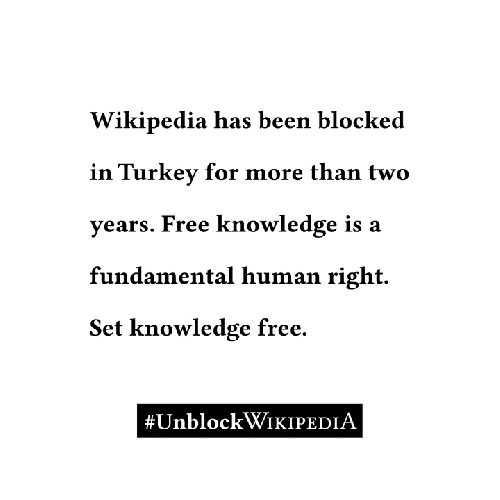At the Wikimedia Foundation, we believe that free access to knowledge and freedom of expression are fundamental human rights. We believe that when people have good information, they can make better decisions. Free access to information creates economic opportunity and empowers people to build sustainable livelihoods. Knowledge makes our societies more informed, more connected, and more equitable.
Over the past two years, we have seen governments censor Wikipedia, including in Turkey and most recently in China, denying these rights to millions of people around the world.
Today, we proceed to the European Court of Human Rights, an international court which hears cases of human rights violations within the Council of Europe, to ask the Court to lift the more than two-year block of Wikipedia in Turkey. We are taking this action as part of our continued commitment to knowledge and freedom of expression as fundamental rights for every person.
This is not a step we have taken lightly; we are doing so only after continued and exhaustive attempts to lift the block through legal action in the Turkish courts, good faith conversations with the Turkish authorities, and campaigns to raise awareness of the block and its impact on Turkey and the rest of the world.
Despite these efforts, Wikipedia continues to be blocked in Turkey after more than two years.

This news was announced in a press call with the Wikimedia Foundation’s Executive Director Katherine Maher, Wikipedia’s founder Jimmy Wales, and the Foundation’s Legal Director Stephen LaPorte.
“We believe that information—knowledge—makes the world better. That when we ask questions, get the facts, and are able to understand all perspectives on an issue, it allows us to build the foundation for a more just and tolerant society,” said Katherine Maher. “Wikipedia is a global resource that everyone can be actively part of shaping. It is through this collective process of writing and rewriting, and debate that Wikipedia becomes more useful, more comprehensive, and more representative. It is also through this process that we, a global society, establish a more comprehensive consensus on how we see the world.”
In our application to the Strasbourg Court, we argue that the blanket ban of Wikipedia violates fundamental freedoms, including the right to freedom of expression as guaranteed by Article 10 of the European Convention. Moreover, these freedoms have been denied to the more than 80 million people of Turkey who have been impacted most directly by the block, and to the rest of the world, which has lost the nation’s rich perspectives in contributing, debating, and adding to Wikipedia’s more than 50 million articles.
Over the past two years, the Wikimedia Foundation has done all that it possibly can to lift the block of Wikipedia in Turkey. The order blocking Wikipedia referred to only two articles, which have continued to be open for improvement by anyone and edited by volunteers around the world despite the block. It is unclear what, if any, concerns remain. The block continues despite numerous good faith discussions with Turkish authorities to understand their views, including through an open letter to the Turkish Minister of Transport, Maritime, and Communication, to discuss Wikipedia’s open editing model, values, and strong opposition to impermissible censorship of any kind.
Immediately following the block, we filed our case in the domestic courts, requesting that Wikipedia be unblocked on the grounds that such a block violated the rights to freedom of expression and freedom of the press. The lower courts have upheld the block, and there has been no response from Turkey’s highest court in the two years since we appealed the lower court’s decision. Consequently, we believe that this step is necessary.
The European Court of Human Rights (ECHR) is the international court created by the European Convention on Human Rights to ensure the enforcement and implementation of the human rights provisions set out in the Convention. Turkey is a long-standing party to the Convention, and the fundamental rights provided by the Convention are guaranteed in the Turkish Constitution, which makes the interference with human rights in this case all the more devastating. Moreover, internet blocks and censorship are a growing concern for Council of Europe states, making this case all the more pressing for consideration by the court.
Today, Wikipedia is one of the most widely-accessed sources of knowledge in the world. It is read 6,000 times every second, and our articles are edited, improved, and debated daily by a community of more than 250,000 volunteers from across the globe. More than 85 percent of those articles are in languages other than English, which includes the Turkish Wikipedia’s more than 300,000 articles, written by Turkish-speaking volunteers for Turkish-speaking people. These volunteers make good-faith efforts to cover all sides of a given topic, even controversial ones, to ensure people can understand topics fully and transparently.
Wikipedia is better, richer, and more reflective of the world when more people can engage with, improve, and edit its content. When one nation is denied access to the global conversation on Wikipedia, the entire world is poorer.
The Wikimedia Foundation is committed to upholding knowledge as a fundamental human right, to be enjoyed and protected for everyone, for our millions of users around the world. We announce our decision to file our application in the European Court of Human Rights today as a reflection of that commitment.
The Wikimedia Foundation is represented by Can Yeginsu, who leads a team of barristers practicing from 4 New Square Chambers in London, and Gonenc Gurkaynak at ELIG Gurkaynak Attorneys-at-Law in Istanbul.

Can you help us translate this article?
In order for this article to reach as many people as possible we would like your help. Can you translate this article to get the message out?
Start translation